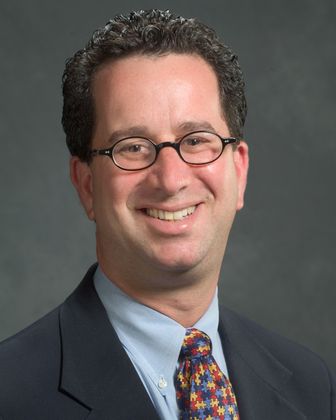FAYETTEVILLE, Ark. — Jay P. Greene’s research on graduation rates in the United States was rated the 11th most influential study in educational policy in the past 10 years by Editorial Projects in Education, the publisher of Education Week.
The Bethesda, Md.-based nonprofit organization’s research center asked leading education-policy experts to identify, then rate highly influential agents in four categories: studies, organizations, people and information sources. The University of Arkansas professor’s research was a leading nominee in the studies category. It ranked fifth among citations in Nexis, a leading search engine for news sources. The research was third most influential among studies in which the author was an individual rather than a government agency, panel or commission. The full report can be seen at http://www.edweek.org/media/influence_study.pdf.
Greene, who holds an endowed chair and is head of the department of education reform in the College of Education and Health Professions; Robert M. Costrell, who holds an endowed chair in accountability; Gary W. Ritter, who holds an endowed chair in education policy; and Patrick J. Wolf, who holds an endowed chair in school choice, all in the department of education reform, have published their work in Education Next, which was named by the experts as the eighth most influential source of information. It was the top-ranked journal among the informational sources deemed most influential. Greene serves as a consulting editor for the quarterly published by Stanford University’s Hoover Institution.
Greene published “High School Graduation Rates in the United States” in 2001 when he worked as a senior fellow at the Manhattan Institute for Policy Research. He came to the University of Arkansas in August 2005.
The research sparked national debate about how graduation rates are figured and led to the National Governors Association’s acknowledgment that existing methods of measuring graduation rates were not reliable.
In 2005, governors of all 50 states and 12 national organizations signed a compact endorsing a task force’s recommendation that a common formula for calculating high school graduation rates be developed. Greene served on the task force, and its report to the governors made numerous references to his 2001 research and another study, “Public High School Graduation and College Readiness Rates: 1991-2002,” he conducted with Marcus Winters, now a UA doctoral fellow.
Greene introduced a new method for calculating graduation rates and presented his results for each of the 50 states, for distinct racial and ethnic group breakdowns and for the 50 largest school districts. He highlighted problems with methods for calculating graduation rates being used by the states and federal agencies, including the practice of counting alternative credentials such as the GED as equivalent to a standard high school diploma and the use of inaccurate self-reported data on educational attainment levels.
“While rooted in a methodological critique, the import of Greene’s work did not escape the notice of the broader education policy community,” according to the new report titled, “Influence: A Study of the Factors Shaping Education Policy” and written by Christopher B. Swanson and Janelle Barlage. Greene was profiled in the section about influential studies.
“First of all, his findings suggest that high school graduation rates in the United States are lower than had previously been believed,” the report continued. “Coming at a time when No Child Left Behind legislation emphasizes educational performance, Greene’s work brought an even greater focus to the issue of high school graduation as a critical outcome indicator and predictor of future success.”
Greene also conducts research on special education, accountability and school choice. The purpose of the UA department of education reform, established in July 2005, is to improve K-12 education in Arkansas and across the nation. It focuses research and demonstration projects on five primary areas of reform: teacher quality, leadership, policy, accountability and transparency, and school choice. Its $20 million endowment supports six endowed chairs and 10 doctoral fellowships.
Greene was also nominated as one of the most influential people by the experts who participated in the study. Examples of his recent public influence include interviews he gave to CNN’s “On the Money” and PBS’s “NewsHour with Jim Lehrer.”
Contacts
,
